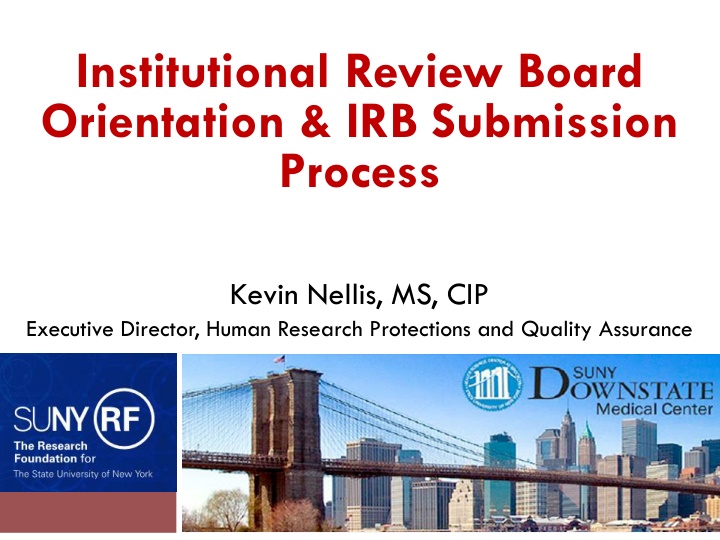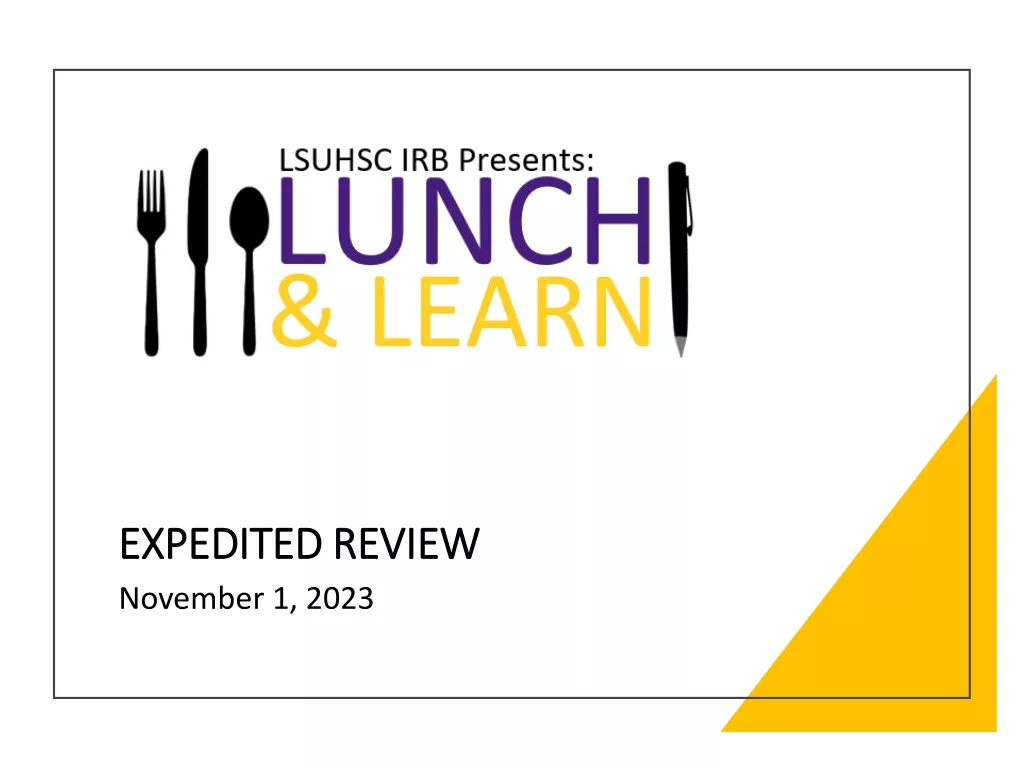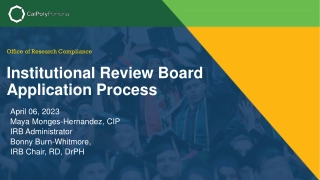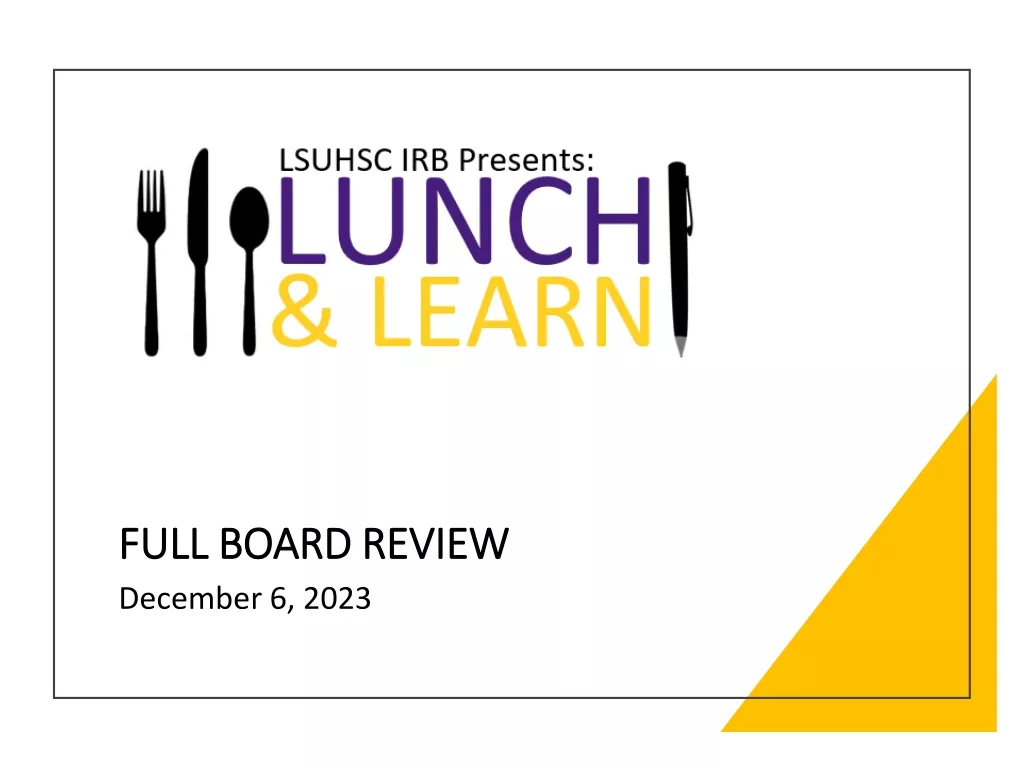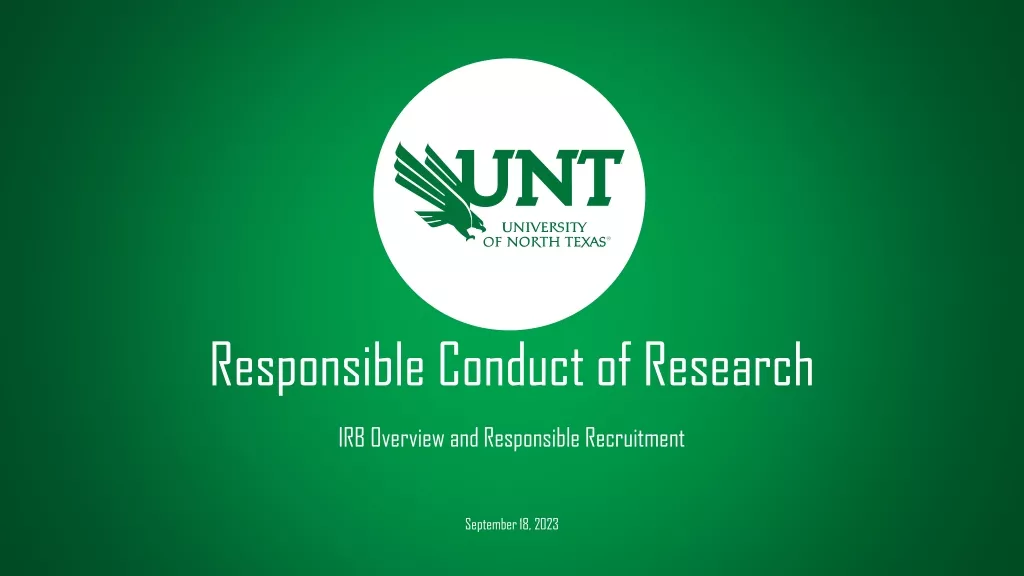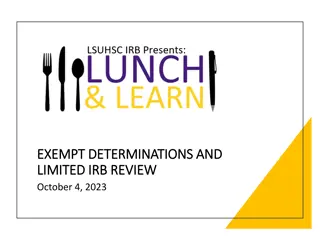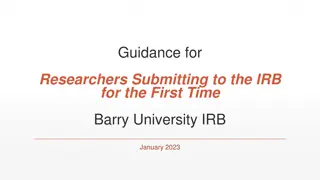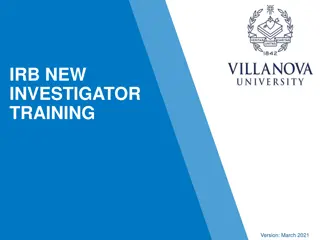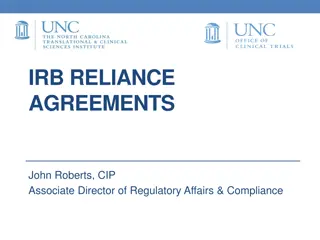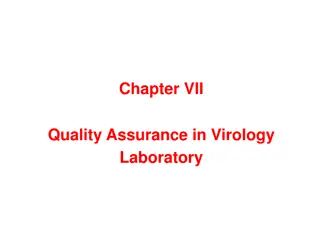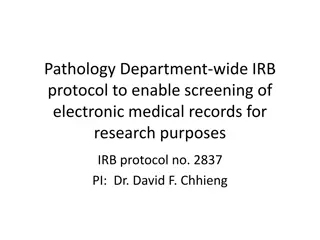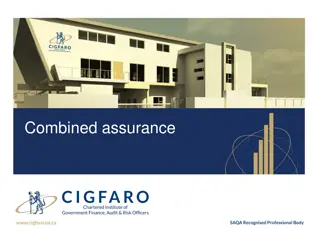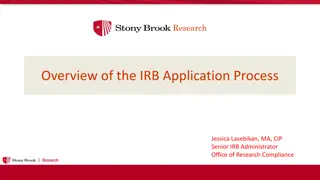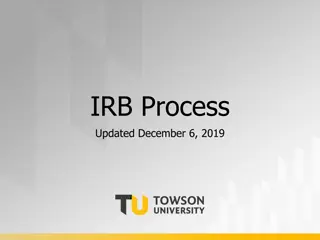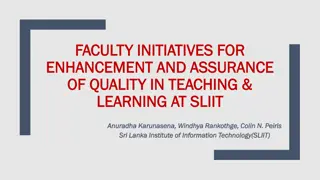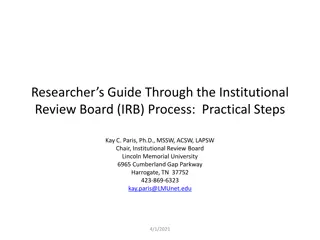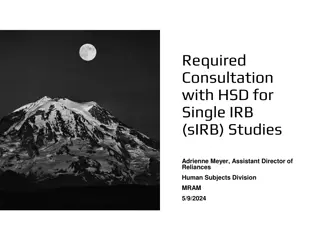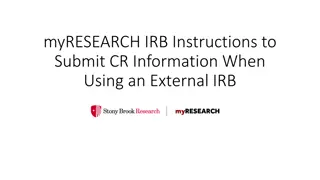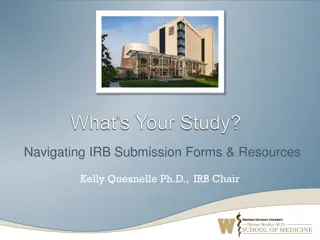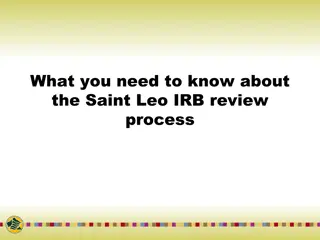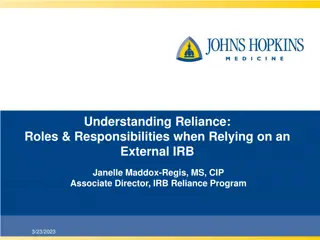Institutional Review Board (IRB) and Quality Assurance Overview
Institutional Review Board (IRB) plays a crucial role in protecting the rights and welfare of research participants, ensuring the validity, ethics, and compliance of human research. This content covers the functions of IRB as a Privacy Board, distinguishes Downstate and non-Downstate workforce investigators/key personnel, and explains important agreements required for external institutions. Understanding these concepts is essential for maintaining research integrity and compliance.
Download Presentation

Please find below an Image/Link to download the presentation.
The content on the website is provided AS IS for your information and personal use only. It may not be sold, licensed, or shared on other websites without obtaining consent from the author.If you encounter any issues during the download, it is possible that the publisher has removed the file from their server.
You are allowed to download the files provided on this website for personal or commercial use, subject to the condition that they are used lawfully. All files are the property of their respective owners.
The content on the website is provided AS IS for your information and personal use only. It may not be sold, licensed, or shared on other websites without obtaining consent from the author.
E N D
Presentation Transcript
man Research Protections and Quality Assurance Institutional Review Board Orientation & IRB Submission Process Kevin Nellis, MS, CIP Executive Director, Human Research Protections and Quality Assurance
Institutional Review Board (IRB) & Privacy Board 2 Protects the rights and welfare of research participants. Empowered to approve, require modifications, or disapprove Human Research. Ensures Human Research is scientifically/scholastically valid, ethical, and in compliance with all requirements. Ensures compliance through oversight functions. Serves as a Privacy Board to ensure HIPAA compliance
Downstate Workforce Investigators/Key Personnel 3 For the purposes of the Downstate IRB, the Downstate Workforce includes individuals who act on behalf of Downstate, including, but not limited to: Downstate Faculty members, employees, and staff Individuals with a Downstate Volunteer Faculty appointment with medical privileges Retired Downstate faculty member with emeritus status Residents, Fellows, or Medical Students that are sponsored by Downstate Students in a Downstate Academic Program Contractors and internal consultants who work on behalf of Downstate Temporary Employees working on behalf of Downstate Downstate Volunteers (officially approved by the Downstate Volunteer Office) Employees or staff of the Research Foundation for SUNY, working on behalf of Downstate
Non Downstate Workforce Investigators/Key Personnel 4 Includes: NYC H+H, Kings County (KC) Includes individuals who are not members of the Downstate Workforce, such as: External consultants, External employees, Individuals with Volunteer Faculty appointments without medical privileges SUNY Downstate IRB Reliance Agreement (IRA) is required when an external institution relies on the Downstate IRB Individual Investigator Agreement (IIA) is required for investigators who are not members of the Downstate Workforce when not covered by an IRA or when their institution does not have a COI adjudication process or COI policy. Downstate has IRA to serve as IRB for KC Both sites have IRA with the BRANY IRB; however, an external IRB application required for Downstate Workforce to confirm local context
Q1: Is it Research? (Under the Common Rule) 5 A Research Activity is BOTH: A systematic investigation (including research development, testing, and evaluation) -AND- Designed to develop or contribute to generalizable knowledge.
Q2: Does it Involve Research Participants (Human Subjects)? (Under the Common Rule) 6 In order for research to be considered human research (and thus requiring IRB approval before the study begins), the research must involve living individuals about whom an investigator (whether professional or student) conducting research either obtains information or biospecimens through intervention or interaction with the individual, and uses, studies, or analyzes the information or biospecimens; or obtains, uses, studies, analyzes, or generates identifiable private information or identifiable biospecimens.
What is Human Research? If YES to Q1 & then YES to Q2: Submit an IRB application to the Downstate Medical Center IRB ------------------------- If NO to either, consult with IRB Q2) Does it involve Research Participants (human subjects)? Q1) Is it research? If YES, go to Q2 IRB@downstate.edu Decision Aid , e-mail IRB@downstate.edu or call X8480.
Is IRB Approval Required for Performance Improvement Activities? It depends! Does it meet the definition of human research? Performance improvement activities do not need IRB approval if: Intent is to improve internal operations, & No intent to contribute to generalizable knowledge Example: A clinic surveys patients to improve the quality of service Without changing intent, clinic staff could Share the results at a conference Publish the results
Is IRB Approval Required for Case Reports or Case Series? Case Reports/Series of up to three (3) individuals do not need IRB approval Such limited activities are generally not considered systematic nor generalizable Examples: Review records of 3 similar patients Review records of one patient and ask questions of 2 family members
Types of IRB Applications Most Common: Exempt Expedited or Full Board External IRB Oversight IRB Decision Aid Other Types: Clinical Use of an Humanitarian Use Device (HUD) Expanded Access (Drug/Biologic for Treatment Use) Honest Broker Agreement (used with other applications)
Exemption Categories (Revised January 2019) 1) Normal educational practices in established educational settings 4) Secondary research for which consent is not required (includes retrospective chart reviews with HIPAA waiver) 2) Educational tests, surveys, interviews, or observation of public behavior 5) Federal research and demonstration projects 6) Taste and food quality evaluation and consumer acceptance studies 3) Benign behavioral interventions with adults with prospective agreement
Examples of Expedited Review Clinical studies of drugs and medical devices only under specific conditions (no IND or IDE) Chart reviews (Consider Exemption #4) Survey research (Consider Exemption #2) Collection of blood samples Biological specimens obtained by non-invasive means Collection of data through non-invasive means Materials collected solely for non-research purposes (Consider Exemption #4) Collection of data from voice, video, etc. (Consider Exemption #2 and/or #3) Research employing surveys, focus groups, etc. (Consider Exemption #2)
Examples of Full Board Review Studies involving greater than minimal risk Clinical Trials involving IND, IDE, or HUD Humanitarian Use Device (HUD) for clinical purpose Expanded Access (Drug/Biologic for Treatment Use) Initial review of research that meets the criteria for expedited review category #1 or #2: If it involves biomedical interventions with children, pregnant women, neonates, prisoners, or cognitively impaired adults If referred by the expedited reviewer
External IRB Oversight Can request the use of an external IRB for multi-site studies Requires IRB Reliance Agreement with External IRB IRA on file: BRANY IRB, NCI CIRB, & those in the SMART IRB Network (over 630 participating sites) Other IRAs determined on a case by case basis with approval of Downstate Institutional Official (IO) Downstate IRB must acknowledge external IRB approval and confirm all local research requirements are met Cannot be used for the following: Downstate as a single site Research previously disapproved by the Downstate IRB
IRB Decision Aid Application for a Determination that IRB Approval is Not required Use FORM A when there is no intention of developing or creating generalizable knowledge, and the proposed activity is limited to one of the following: Health care operations activity (e.g., performance improvement), Case report or case series (up to three individuals) Operational activity, Pilot activity, feasibility activity, or evidence-based practice activity, Training or educational activity, or Not engaged in human research. Use FORMB B for any request
Suggested Timeline (Start Early!) 16 Review Downstate IRB website for instructions and details: https://research.downstate.edu//irb/irb.html Complete training and submit COI disclosures http://research.downstate.edu/irb/irb-training.html Plan your project Identify Investigator with PI Status (Seasoned Downstate Faculty with field-specific terminal degree, KC Clinician with clinical privileges, External PI, etc.) Develop Protocol (Templates on IRB website) Hypothesis, Aims, & Objectives Methods, Procedures, Data Collection Consult Biostatistician for power analysis and statistical tests
Suggested Timeline (Continued) 17 Complete IRBNet Registration form in IRBNet Upload all applicable materials in IRBNet Application Consent form(s), including short forms IND/IDE documentation Data Collection tools Waivers Recruitment materials Other materials as outlined on IRB website Request IRB Office Pre-Review (OPTIONAL) Obtain e-signatures (PI, Chair/Dean, Ancillary Reviewers) Submit to IRB in IRBNet
Downstate IRB Approval/Disapproval 18 When reviewed by Downstate IRB: Approve Approve with conditions Response reviewed by expedited review Require modifications to secure approval Response reviewed by Full Board, if initial review was required by Full Board Disapprove/ Not Approved / Deferred / Tabled When reviewed by an External IRB: Acknowledgement Pending External IRB Approval Acknowledgement (of external IRB approval)
Respond to the IRB in a Timely Manner Unlocked package in IRBNet by IRB: Revise as requested Lock package and mark revisions complete Modifications Letter published by IRB: Submit follow-up package in IRBNet Include point by point response cover letter CAUTION: Withdrawn by IRB if response is not timely
Post IRB Approval Requirements Check IRB approved materials for accuracy For NYC H+H, Kings County studies, obtain STAR approval Obtain Sponsored Programs approval, when applicable Obtain Institutional Biosafety Committee Approval, when required, before starting study Obtain legally effective informed consent, using IRB approved stamped document(s) (when applicable)
Post IRB Approval Applications Acknowledgement Reportable Events Amendment (2 TYPES) Staff Changes Only (all other changes) Continuing Review (3 OPTIONS) Abbreviated forms for External IRB or HUD for Clinical Use Check-In Report (for studies with 3 year approval periods) Final Report (Study Closure)
Reportable Events Government Inspections (or audit) Termination or suspension Privacy or Information (Data) Security Violation (Breach) Incarceration of a research participant Any FDA Action or Changes to HUD Unanticipated Serious Adverse Event Research related Injury involving provision of healthcare Apparent non-compliance (including serious or continuing non-compliance) New information that indicates a change to the risks or potential benefits of the project Administrative or enrollment hold Local unanticipated problem involving risks to participants or others Unexpected Adverse Event Audit or Monitor activities Unanticipated adverse device effect Interim Analysis report or DSMB report Adverse Event, external event, or other sponsored required reporting Significant new finding Changes to eliminate an apparent immediate hazard
Contact IRB for HELP Call: (718) 613-8480 E-mail: IRB@downstate.edu IRB Office: Basic Science Building Room 3-26 Appointments recommended Walk-ins welcome (9AM 5 PM)
Downstate IRB Contacts Clinton Brown, MD, IRB Chair (718) 270-1729 Stanley Friedman, MD, Vice Chair (718) 270-1335 Jeannette Jakus, MD, Vice Chair (718) 270-1229 Kevin L. Nellis, MS, CIP, Executive Director, Human Research Protection & Quality Assurance (718) 613-8461 Diann Johnson, MPH, Associate IRB Administrator (718) 270-4341 Nikol Celestine, BA, CIP, IRB Management Analyst (718) 270-4411 Nakih Gonzales, IRB Assistant (718) 270-4372 IRB Office (BSB 3-26) IRB@downstate.edu (718) 613-8480
Additional Downstate Contacts Privacy Officer: (718) 270-4033 Information Security: (718) 270-4621 Sponsored Programs Administration: (718) 270-2680 Office of Technology Commercialization: (718) 613-8515 Office of Compliance and Audit Services: (718)270-4033 Compliance Training Program: (718) 270-4033
NYC H+H, Kings County All research conducted at NYC H+H, Kings County must also be in compliance with H+H policy and approved in System to Track and Approve Research (STAR). IRB Approval is required before information can be entered in STAR. For more information refer to the NYC H+H, Kings County policies at: https://research.downstate.edu//irb/irb-policies.html For any questions about NYC H+H, Kings County policy, please contact: Michele Follen, MD, PhD, MBA; Director of Research and Chair, Facility Research Review Committee, NYC Health + Hospitals/Kings County (718) 613-8401 or follenm@nychhc.org Bryce Petty, CCRC, Facility Research Coordinator: (718) 613-8185 or Bryce.Petty@nychhc.org (Bryce Petty is the best contact for STAR) Note: The Site Principal Investigator for a study conducted at NYC H+H, Kings County must be a full-time, part-time or voluntary physician who is a member of the Medical Staff at Kings County and who has appropriate clinical privileges as defined in the Facility's Medical Staff Bylaws. This individual must also be approved by the reviewing IRB as personnel on the study.
Summary Submit online application when IRB approval is required Follow instructions and guidance Call or visit the IRB Office for help
